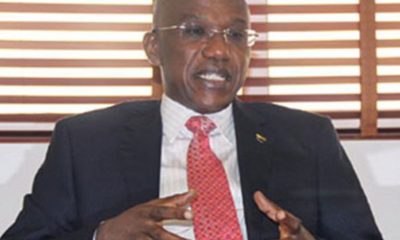- Together CBN, AMCON Spend N3.83 Trillion on Struggling Banks
The Central Bank of Nigeria (CBN) and the Asset Management Corporation of Nigeria (AMCON) have so far spent N3.83 trillion on struggling banks since 2009, according to report.
The bailout, which started in 2009 when the CBN first injected N620 billion into ten struggling banks to prevent the banking sector from collapsing, has taken a new turn as it failed to revive the affected banks.
In August 2011, the CBN was forced to revoke the licence of Bank PHB, Afribank, and Spring bank and created bridge banks to take over their assets and liabilities. While AMCON funded the bridge banks with N679 billion.
This was after AMCON had purchased about 14,000 loans estimated at N3.3 trillion for N1.7 trillion in 2010, stated Ahmed Kuru, AMCON’s Managing Director.
According to Kuru, the firm also provided financial accommodation of N2.2 trillion, however, only 300 customers that constituted 5 percent of the 14,000 loans were responsible for over 70 percent of the total value of loans that were purchased.
Despite 5 percent of customers responsible for majority of the loans that went bad as at 2017, AMCON only recovered N716.1 billion from obligors, cash and assets accounted for 45 percent and 55 percent respectively.
Left with huge debt with no end in sight, AMCON approached the Federal High Court on September 22, 2018 for assistance in recovering N5.4 trillion non-performing loans, a day after the CBN revoked SKYE Bank licence and created another bridge bank, Polaris Bank.
Again, the new bridge bank, Polaris Bank, will once again be funded N786 billion by AMCON after assuming assets and liabilities of Skye bank, which according to Godwin Emiefele, CBN’s Governor, has a negative book value of about N800 billion due to high non-performing loans. Meaning for the new Polaris Bank to thrive it needs all the help it can get it.
AMCON total investment on distressed banks now stood at N3.16 trillion –N679 billion spent on three bridge banks, N1.75 trillion used in acquiring debt of financial institutions and the N786 billion to be injected into the new Polaris bank.
However, experts have accused the CBN and FG of encouraging the financial misconduct going on in the banking sector as many bank executives and directors were allowed to go scot free without prosecution despite the size of the funds.
John Darlington, former Bond Bank managing director, urges shareholders to sue executives, managing directors, and non-exexcutives who ran down their banks. According to Darlington, past CEOs, like Skye’s CEO, should ‘face the law’ for running down banks.
“They looted the patrimony of a whole lot of shareholders and destroyed otherwise what was meant to be a solid bank,” he stated.
“I believe shareholders must now come together under an umbrella and go after the management and the board that looted and destroyed their common patrimony. Let us test it in court and see if they can get justice against those who looted the assets of the bank and destroyed their investments.”
Abiola Babajide, Associate Professor Department of Finance, Covenant University, said: “Bailouts incite bad behaviour in the banking industry as this bailout isn’t really changing anything fundamentally as another bank can still fail tomorrow. The root of the problem is still not being tackled. We need to address the ethical issues in the bank; corporate governance right now is very bad in the country.”
Babajide, who agreed that the bailouts have helped protect depositors’ funds and create stability in the banking sector, said without profitability it will be at the expense of the taxpayers.
Still, he thinks for the sake of stability in the sector it is imperative.
“In the real sense, not all of the money that the regulators have invested in these banks have been fully recouped so it is not profitable for the CBN to continues bailouts but for the sake of stability in the industry it is important they do,” he concluded.
A depositor with one of the affected banks, Ishioma Ogbekene, a freight forwarder, said: “Banks have risk managers, there are limits to the amount that can be lent and loans are usually secured with collateral, so why will a bank collapse?”
“But because bank chairmen, CEOs and board members take huge loans that are not backed by collateral and eventually failed to repay, collapses those banks. Forcing the government to use taxpayers’ money to stabilise the sector and protect jobs.”
“CBN is not effective in her oversight function,” said Ezekiel Enejeta, the Founder of Financial Watch Nigeria. “Executives of collapsed banks were supposed to be investigated and jailed if found guilty to restore some sanity back to the system.”

 Forex3 weeks ago
Forex3 weeks ago


 Naira2 weeks ago
Naira2 weeks ago
 Billionaire Watch2 weeks ago
Billionaire Watch2 weeks ago




 Naira2 weeks ago
Naira2 weeks ago




 Naira4 weeks ago
Naira4 weeks ago




 Naira2 weeks ago
Naira2 weeks ago


 Naira7 days ago
Naira7 days ago
 Banking Sector4 weeks ago
Banking Sector4 weeks ago















